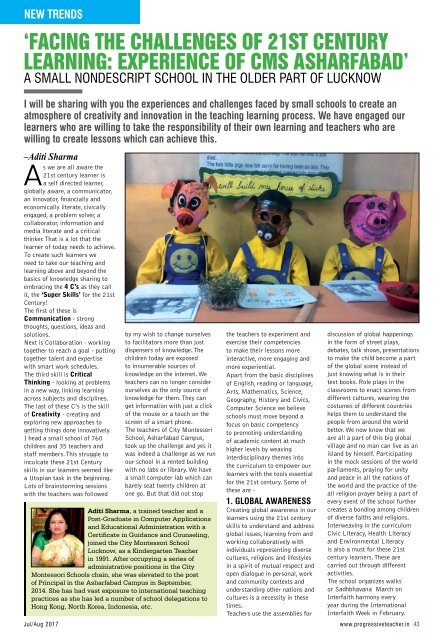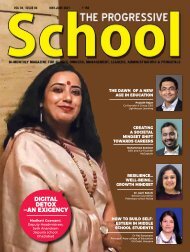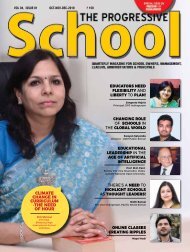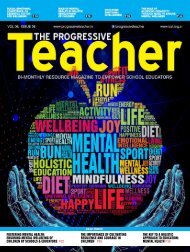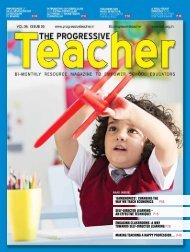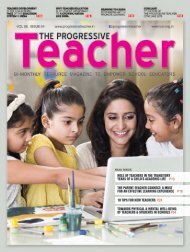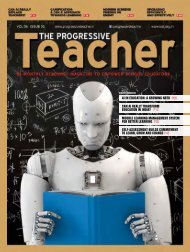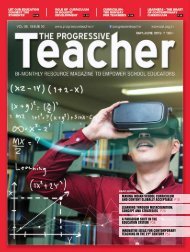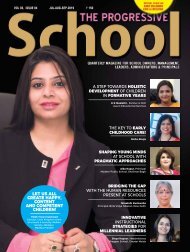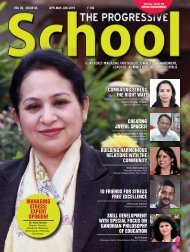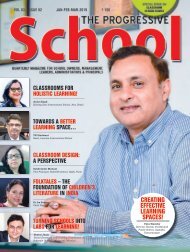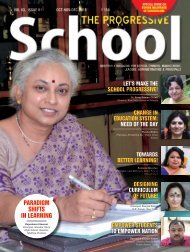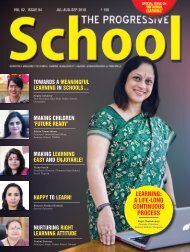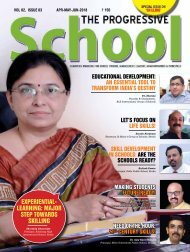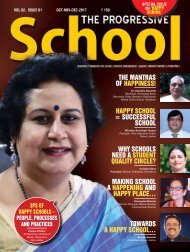The Progressive Teacher Vol 04 Issue 03
This issue of The Progressive Teacher focuses on "New Trends in Education ". In this edition, articles explore contemporary trends to enhance interactive learning amongst students.
This issue of The Progressive Teacher focuses on "New Trends in Education ". In this edition, articles explore contemporary trends to enhance interactive learning amongst students.
Create successful ePaper yourself
Turn your PDF publications into a flip-book with our unique Google optimized e-Paper software.
new trends<br />
‘Facing the Challenges of 21st Century<br />
Learning: Experience of CMS Asharfabad’<br />
a small nondescript school in the older part of Lucknow<br />
I will be sharing with you the experiences and challenges faced by small schools to create an<br />
atmosphere of creativity and innovation in the teaching learning process. We have engaged our<br />
learners who are willing to take the responsibility of their own learning and teachers who are<br />
willing to create lessons which can achieve this.<br />
–Aditi Sharma<br />
As we are all aware the<br />
21st century learner is<br />
a self directed learner,<br />
globally aware, a communicator,<br />
an innovator, financially and<br />
economically literate, civically<br />
engaged, a problem solver, a<br />
collaborator, information and<br />
media literate and a critical<br />
thinker. That is a lot that the<br />
learner of today needs to achieve.<br />
To create such learners we<br />
need to take our teaching and<br />
learning above and beyond the<br />
basics of knowledge sharing to<br />
embracing the 4 C’s as they call<br />
it, the ‘Super Skills’ for the 21st<br />
Century!<br />
<strong>The</strong> first of these is<br />
Communication - strong<br />
thoughts, questions, ideas and<br />
solutions.<br />
Next is Collaboration - working<br />
together to reach a goal - putting<br />
together talent and expertise<br />
with smart work schedules.<br />
<strong>The</strong> third skill is Critical<br />
Thinking - looking at problems<br />
in a new way, linking learning<br />
across subjects and disciplines.<br />
<strong>The</strong> last of these C’s is the skill<br />
of Creativity - creating and<br />
exploring new approaches to<br />
getting things done innovatively.<br />
I head a small school of 760<br />
children and 35 teachers and<br />
staff members. This struggle to<br />
inculcate these 21st Century<br />
skills in our learners seemed like<br />
a Utopian task in the beginning.<br />
Lots of brainstorming sessions<br />
with the teachers was followed<br />
Aditi Sharma, a trained teacher and a<br />
Post-Graduate in Computer Applications<br />
and Educational Administration with a<br />
Certificate in Guidance and Counseling,<br />
joined the City Montessori School<br />
Lucknow, as a Kindergarten <strong>Teacher</strong><br />
in 1991. After occupying a series of<br />
administrative positions in the City<br />
Montessori Schools chain, she was elevated to the post<br />
of Principal in the Asharfabad Campus in September,<br />
2014. She has had vast exposure to international teaching<br />
practices as she has led a number of school delegations to<br />
Hong Kong, North Korea, Indonesia, etc.<br />
Jul/Aug 2017<br />
by my wish to change ourselves<br />
to facilitators more than just<br />
dispensers of knowledge. <strong>The</strong><br />
children today are exposed<br />
to innumerable sources of<br />
knowledge on the internet. We<br />
teachers can no longer consider<br />
ourselves as the only source of<br />
knowledge for them. <strong>The</strong>y can<br />
get information with just a click<br />
of the mouse or a touch on the<br />
screen of a smart phone.<br />
<strong>The</strong> teachers of City Montessori<br />
School, Asharfabad Campus,<br />
took up the challenge and yes it<br />
was indeed a challenge as we run<br />
our school in a rented building<br />
with no labs or library. We have<br />
a small computer lab which can<br />
barely seat twenty children at<br />
one go. But that did not stop<br />
the teachers to experiment and<br />
exercise their competencies<br />
to make their lessons more<br />
interactive, more engaging and<br />
more experiential.<br />
Apart from the basic disciplines<br />
of English, reading or language,<br />
Arts, Mathematics, Science,<br />
Geography, History and Civics,<br />
Computer Science we believe<br />
schools must move beyond a<br />
focus on basic competency<br />
to promoting understanding<br />
of academic content at much<br />
higher levels by weaving<br />
interdisciplinary themes into<br />
the curriculum to empower our<br />
learners with the tools essential<br />
for the 21st century. Some of<br />
these are -<br />
1. GLOBAL AWARENESS<br />
Creating global awareness in our<br />
learners using the 21st century<br />
skills to understand and address<br />
global issues, learning from and<br />
working collaboratively with<br />
individuals representing diverse<br />
cultures, religions and lifestyles<br />
in a spirit of mutual respect and<br />
open dialogue in personal, work<br />
and community contexts and<br />
understanding other nations and<br />
cultures is a necessity in these<br />
times.<br />
<strong>Teacher</strong>s use the assemblies for<br />
discussion of global happenings<br />
in the form of street plays,<br />
debates, talk shows, presentations<br />
to make the child become a part<br />
of the global scene instead of<br />
just knowing what is in their<br />
text books. Role plays in the<br />
classrooms to enact scenes from<br />
different cultures, wearing the<br />
costumes of different countries<br />
helps them to understand the<br />
people from around the world<br />
better. We now know that we<br />
are all a part of this big global<br />
village and no man can live as an<br />
island by himself. Participating<br />
in the mock sessions of the world<br />
parliaments, praying for unity<br />
and peace in all the nations of<br />
the world and the practice of the<br />
all religion prayer being a part of<br />
every event of the school further<br />
creates a bonding among children<br />
of diverse faiths and religions.<br />
Interweaving in the curriculum<br />
Civic Literacy, Health Literacy<br />
and Environmental Literacy<br />
is also a must for these 21st<br />
century learners. <strong>The</strong>se are<br />
carried out through different<br />
activities.<br />
<strong>The</strong> school organizes walks<br />
or Sadhbhavana March on<br />
Interfaith harmony every<br />
year during the International<br />
Interfaith Week in February.<br />
www.progressiveteacher.in 43


